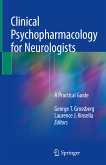The wide acceptance of the amyloid cascade hypothesis has led to vigorous development of disease-modifying drugs for Alzheimer's disease, such as amyloid vaccinations and gamma- or beta-secretase inhibitors. However, the fact that clinical trials of these drugs have not yet yielded satisfactory results has meant that for the time being patients continue to be treated only with symptomatic drugs. Currently, four such drugs are available: donepezil, galantamine, rivastigmine, and memantine. In this book, the four leading experts on each of these drugs explain their practical pharmacology with the aim of providing a sound basis for their use, which to date has been of questionable proficiency. In addition, an introductory chapter considers the basic theory of pharmacology for Alzheimer's disease and the book closes with an overview of the ways in which symptomatic drugs are used for dementia.
Dieser Download kann aus rechtlichen Gründen nur mit Rechnungsadresse in A, B, BG, CY, CZ, D, DK, EW, E, FIN, F, GR, HR, H, IRL, I, LT, L, LR, M, NL, PL, P, R, S, SLO, SK ausgeliefert werden.









